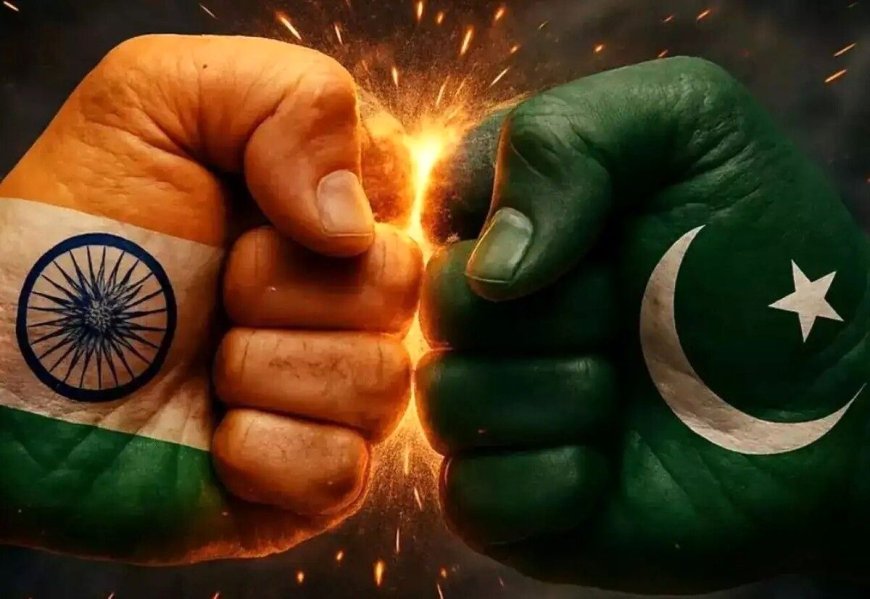Made in Tel Aviv, Launched in Kashmir: The Deadly Cost of Israel-India Military Ties
India is rapidly accelerating its purchase of Israeli weapons. According to the Stockholm International Peace Research Institute (SIPRI), from 2021 to 2024, India spent over $4.8 billion on Israeli drones, missiles, and radar systems. A Pakistani government official remarked, “Every time India receives a new shipment from Tel Aviv, we’re compelled to deepen our military ties with China and Turkey. This arms race is driving the region toward the brink.”

In the early hours before dawn, when darkness still blanketed the city of Muzaffarabad in Pakistan-administered Kashmir, the sky was pierced by the roar of unidentified drones. Ruqayya, a 32-year-old nurse at the local hospital, still trembles at the memory of last week's explosion. “Suddenly, everything shook,” she recalls. “When I reached the emergency room, a mother and her two children were brought in—bodies riddled with shrapnel. They said a drone caused it.”
Satellite images released by Asia Watch corroborate her account: Heron TP and Harop drones—manufactured by the Israeli regime—routinely fly over the disputed Kashmir region. These advanced UAVs, armed with Spike missiles and precision-guided bombs, frequently target military positions—and at times, civilian areas. In the past six months, 42 drone strikes have been recorded, 60% of which have impacted non-combatants.
Fueling the Fire: How Israel’s Arms Are Supercharging South Asia’s Arms Race
India is rapidly accelerating its purchase of Israeli weapons. According to the Stockholm International Peace Research Institute (SIPRI), from 2021 to 2024, India spent over $4.8 billion on Israeli drones, missiles, and radar systems. A Pakistani government official remarked, “Every time India receives a new shipment from Tel Aviv, we’re compelled to deepen our military ties with China and Turkey. This arms race is driving the region toward the brink.”
Foreign Boots on Indian Soil: What Are Israeli Advisors Really Doing Here?
India’s military dependence on the Israeli regime extends beyond weapon purchases. Leaked documents by the hacker group Chaos reveal that 200 Israeli advisors are currently training Indian forces at military bases including Amrala and New Delhi. Moreover, a $1.2 billion joint hypersonic missile project is underway. This indicates that Israel views India as a testing ground for its advanced weapons—a deeply troubling development for neighboring countries that value regional stability. Tel Aviv's overt support for New Delhi is playing a dangerous game.
Spying from the Clouds: Surveillance, Control, and Psychological Warfare
Israel not only supplies arms to India but also backs it on the diplomatic front. In 2023, when India was criticized at the UN over drone attacks, Israel’s ambassador to New Delhi declared, “We stand with our strategic partner.” These words were not just rhetorical. An Al Jazeera investigation revealed close intelligence cooperation between Mossad and India's RAW agency. For neighboring countries, this alliance poses a direct threat—as Israel’s influence in South Asia opens a new front against Muslim nations.
From the perspective of those concerned with regional peace, this support undermines India’s credibility. A diplomat based in Islamabad stated, “India thinks Israeli weapons make it stronger, but in truth, it has become a tool in Tel Aviv’s hands.”
From Occupied Palestine to Occupied Kashmir: A Shared Playbook of Oppression
Military cooperation between India and Israel dates back to the 1990s, when diplomatic relations were formalized. However, since Prime Minister Narendra Modi and the Bharatiya Janata Party (BJP) came to power, this cooperation has surged dramatically. According to Foreign Policy, Israel is now India’s second-largest arms supplier, after Russia.
From Barak naval missiles to EL/M-2084 radar systems, Israeli technology underpins much of India’s military. Additionally, 1,200 Indian commandos have trained at Israel’s Negev base.
This military dependency has serious regional consequences. Neighboring nations have repeatedly warned that the influx of advanced weaponry into a tense area like Kashmir only escalates hostilities. In response, Pakistan has turned to Turkish Bayraktar drones and Chinese missile systems—pushing the region closer to full-scale war.
Collateral Damage or Calculated Terror? Civilians in the Crosshairs
The repercussions of this crisis extend beyond the battlefield. Human Rights Watch reports that in 2024 alone, 580 civilians were killed in drone strikes, 70% of whom were women and children. Twelve schools and four hospitals were also destroyed. Zahra, a teacher from a border village, says, “The students are too scared to attend school because of the drones.”
Diplomatically, India is becoming increasingly isolated in the Muslim world. In 2024, the Organization of Islamic Cooperation (OIC) issued two statements condemning India’s drone attacks. For a country that once prided itself on being peace-loving, this marks a significant blow to its international image. Neighboring states, committed to mediating regional conflicts, have proposed a tripartite committee involving Turkey and Malaysia to oversee the situation in Kashmir. One senior regional diplomat emphasized, “Asia’s security must not be sacrificed for the profit of arms manufacturers.”
South Asia’s Powder Keg: Is an Israeli-Backed Conflict Inevitable?
Experts foresee three possible outcomes:
1. Continued border skirmishes at current intensity
2. A limited nuclear conflict that could claim millions of lives in under a week
"Mohsen Kazemi," a professor of international relations at Tehran University, warned, "If Israeli influence is not contained, South Asia will become a scene similar to Yemen and Syria, but with even more catastrophic consequences
3. Mediation by a regional or extra-regional power leading to a ceasefire
Countries in the region are working diplomatically to avert disaster. Proposals include establishing a no-fly zone over Kashmir and sanctioning weapons manufacturers like Rafael and Israel Aerospace Industries (IAI)—a sign of the region’s determination to safeguard peace.
Final Thoughts
This is more than a border dispute—it’s a growing threat to the entire region’s stability. Israel’s weaponry has lit a fire that could consume South Asia. Now is the time for the Islamic world and the international community to act with vigilance and unity—to prevent a catastrophe that’s still avoidable.
Sources:
1. Annual Report of the Stockholm International Peace Research Institute (SIPRI) on Arms Trade, 2024.
2. India-Israel Military Ties, Foreign Policy Magazine, 2023.
3. Field Report by Human Rights Watch on Kashmir, January 2024.
4. Drone Strikes in Kashmir, Al Jazeera Network, 2023.
5. Analysis by Tehran Center for Strategic Studies, February 2024.
*Translated by Ashraf Hemmati from the original Persian article written by M. Alipour













































